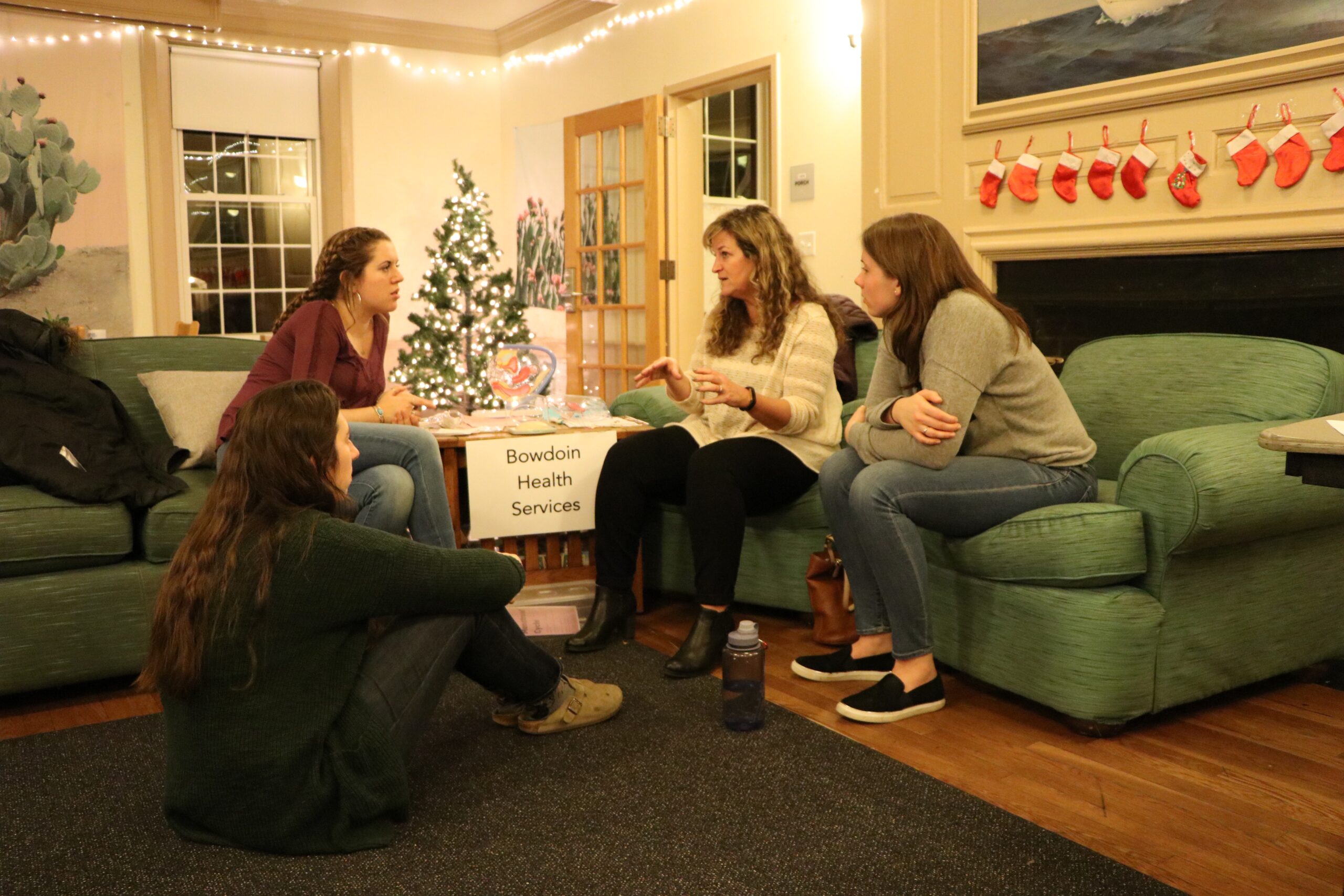Senior project promotes reproductive health on campus
December 8, 2017
 Jenny Ibsen
Jenny IbsenFrom Peer Health to Healthy Relationships, there are a number of campus organizations dedicated to student health at Bowdoin. Despite the active presence of these groups, Bowdoin students can sometimes find it difficult to access resources related to sexual and reproductive health. To address this issue, Martinique Ogle ’18 hosted “Snacks and Sex-Ed” at Macmillan House Thursday night—an event designed to provide knowledge and empowerment to all students, especially first years.
The event, which featured booths and representatives from Peer Health, Bowdoin Healthy Relationships, Health Services, the Sex Project and Topsham Planned Parenthood, was designed as an open house to bring the many resources available to all students, regardless of gender, together in one place with demonstrations and interactive activities.
“I wanted to have an event that could break down a lot of the intimidating barriers that I think exist for younger women and younger people here on campus.” said Ogle, noting that a number of students she spoke with before beginning her project hadn’t known much about these resources.
One of the biggest barriers Ogle found was the adjustment from high school to college with relation to conversations surrounding sex.
Ogle explains, “a collegiate environment is going to be a lot more open and public with talking about sex than a high school environment will ever be. When you show up as a first year you are not used to the halls of your high school filled with people saying ‘come to this group to talk about sex,’ so I think it is bit of an adjustment period.”
Going forward, Ogle notes that she would be interested in hosting further events or creating pamphlets.
“It has been a good experience to learn how I, as a scientist, can learn a bunch of scientific information, and then write about it for non-scientists,” she said.
Aiming to ease this adjustment, “Snacks and Sex Ed” was just one part of Ogle’s, a biology major, independent study on endocrinology and reproductive health. Ogle’s study initially began as a biology project, but eventually evolved to include a public health initiative for Bowdoin women. Along with organizing the event, Ogle created easy-to-read pamphlets on the science and significance of topics such as the menstrual cycle and intrauterine devices (IUDs) with the help of Bowdoin Health Services.
These pamphlets will now be available at the Bowdoin Health Center.
As complicated as the actual science may be, Ogle emphasizes this information should be common knowledge, particularly for women.
“If you have a uterus you should really know how it works because it is a major organ,” Ogle said.
In order to communicate this important information, Ogle collaborated with Julie Gray of Health Services, assistant physician. Gray gave demonstrations and spoke about contraceptive options available through Health Services at Thursday’s event.
Gray, who often works with student groups, promotes Health Services as a welcoming, confidential resource for the student body.
“I would love it if every student on this campus could recognize this is a place to have confidential health services for all,” said Gray. “[Health Services] is a place students can come to for a confidential clinical visit and strategize around how to protect themselves as much as possible.”
Despite the inclusive attitude of Health Services, many students, particularly first year women, are unaware of the variety services they provide. As Ogle herself reveals, “I did not know Health [Services] gave prescriptions for IUDs until I was like halfway through my freshman year.”
Moreover, Health Services will provide taxi fare to and from the nearest Planned Parenthood in Topsham to have the IUD implant procedure done. For students who choose other forms of contraception, Health Services provides prescriptions for oral contraceptives, Nuvaring, the Shot and the Patch along with free condoms.
According to Gray, explaining to women how they can access birth control confidentially and easily can be an empowering first step for young women beginning to manage their own lives.
“Conversations like these have the potential to really change a student’s life, especially if they’re concerned with not getting pregnant,” said Gray. “That constant worry on top of all the work in college is enormous.”
Gray notes that fear of costs can also impede students from seeking the healthcare they need.
“For students who cannot pay we make it so they can get the devices they need for next to nothing,” said Gray. “That is enormous first step, especially if it’s done confidentially.”

Comments
Before submitting a comment, please review our comment policy. Some key points from the policy: